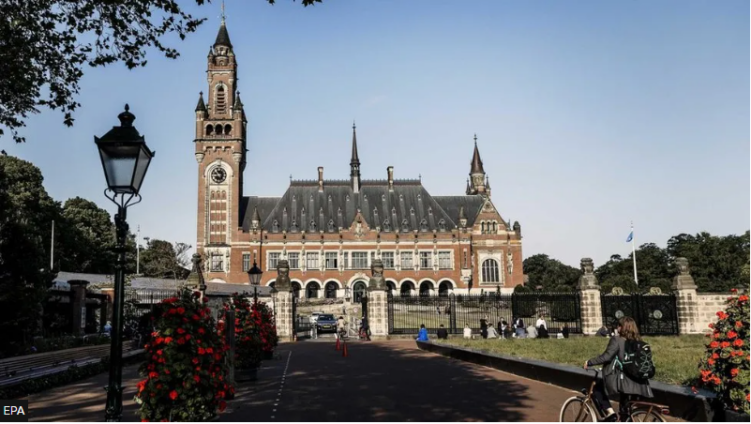The UN's International Court of Justice is to hear a case brought by South Africa accusing Israel of committing genocide against Palestinians in Gaza.
The submission also calls on the court to order Israel to stop military operations there.
The ICJ will deliver only an opinion on the genocide allegation as the case is not a criminal trial, although it is being keenly watched.
Israel has vehemently rejected the accusation as baseless.
In its submission, South Africa says Israel's actions "are intended to bring about the destruction of a substantial part of the Palestinian national, racial and ethnical group".
It says Israel's actions include "killing Palestinians in Gaza, causing them serious bodily and mental harm, and inflicting on them conditions of life calculated to bring about their physical destruction".
It calls for "provisional measures" to be implemented by the court, including that Israel cease all military activities in Gaza.
Israeli President Isaac Herzog called the accusations "atrocious and preposterous".
"We will be in the International Court of Justice and we will present proudly our case of using self-defence… under humanitarian law," he said.
He added that the Israeli army was "doing its utmost under extremely complicated circumstances on the ground to make sure that there will be no unintended consequences and no civilian casualties".
The ICJ - the UN court based in the Hague in the Netherlands - could rule quickly on South Africa's request for Israel to suspend its military campaign - but a final ruling on whether Israel is committing genocide could take years.
ICJ rulings are theoretically legally binding on parties to the ICJ - which include Israel and South Africa - but are not enforceable.
In 2022, the court ordered Russia to "immediately suspend military operations" in Ukraine, an order that was ignored.
South Africa has been highly critical of Israel's military operation in Gaza, and its governing African National Congress has a long history of solidarity with the Palestinian cause.
It sees parallels with its struggle against apartheid - a policy of racial segregation and discrimination enforced by the white-minority government in South Africa against the country's black majority, until the first democratic elections, in 1994.
In Gaza, more than 23,350 people have been killed, according to the Hamas-run health ministry, since the war began in the aftermath of Hamas's 7 October attacks on southern Israel. In those attacks some 1,300 people were killed - mainly civilians - and about 240 others taken hostage.
Latest Stories
-
Ghana and Seychelles strengthen bilateral ties with focus on key sectors
9 mins -
National Elections Security Taskforce meets political party heads ahead of December elections
12 mins -
Samsung’s AI-powered innovations honored by Consumer Technology Association
32 mins -
Fugitive Zambian MP arrested in Zimbabwe – minister
50 mins -
Town council in Canada at standstill over refusal to take King’s oath
1 hour -
Trump picks Pam Bondi as attorney general after Matt Gaetz withdraws
1 hour -
Providing quality seeds to farmers is first step towards achieving food security in Ghana
1 hour -
Thousands of PayPal customers report brief outage
2 hours -
Gary Gensler to leave role as SEC chairman
2 hours -
Contraceptive pills recalled in South Africa after mix-up
2 hours -
Patient sues Algerian author over claims he used her in novel
2 hours -
Kenya’s president cancels major deals with Adani Group
2 hours -
COP29: Africa urged to invest in youth to lead fight against climate change
3 hours -
How Kenya’s evangelical president has fallen out with churches
3 hours -
‘Restoring forests or ravaging Ghana’s green heritage?’ – Coalition questions Akufo-Addo’s COP 29 claims
3 hours

